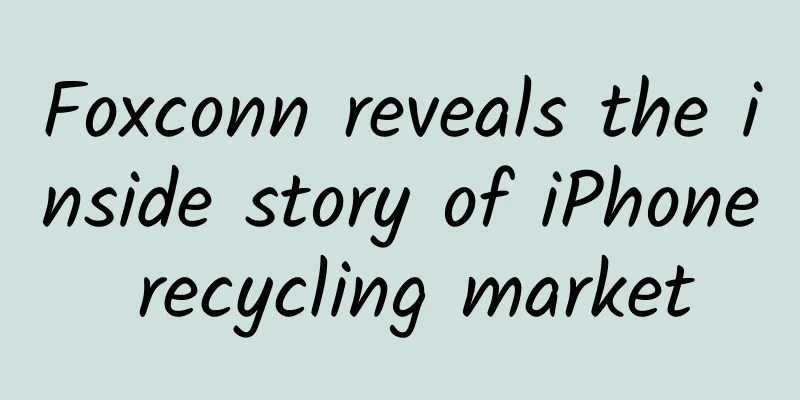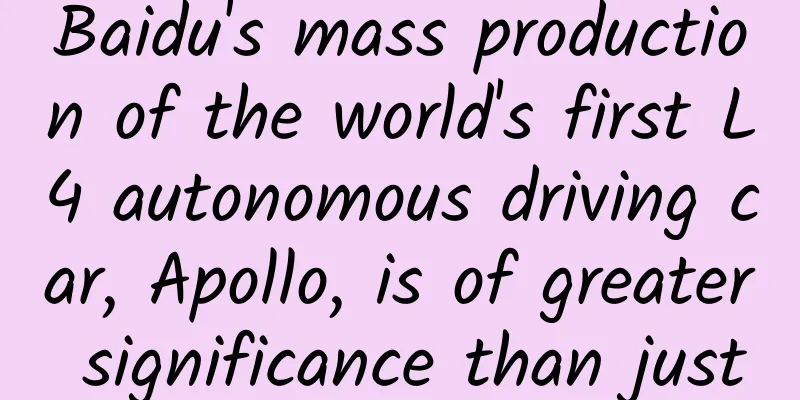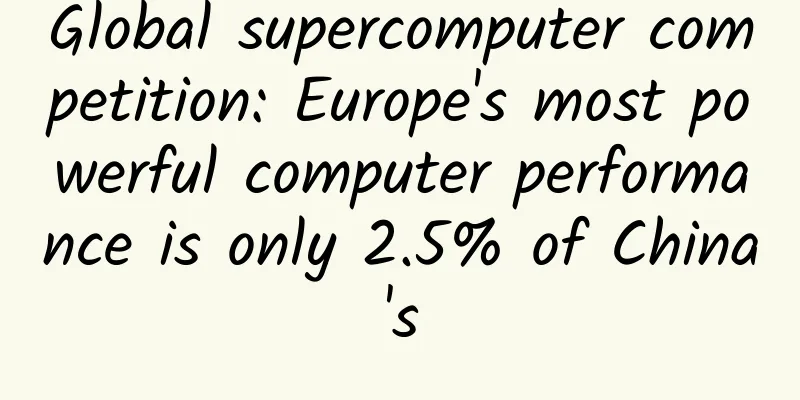Foxconn reveals the inside story of iPhone recycling market

|
The main business of the new company, Aifengpai, is to recycle discarded iPhones from users in first- and second-tier cities, and then resell them after rigorous inspection and repackaging. Unlike large and small factories that rely on refurbishing Apple products for a living, Aifengpai is a brand-new subsidiary of iPhone manufacturer Foxconn. In other words, they are a regular army authorized by Apple. A year ago, Foxconn approached Apple, hoping to run a second-hand iPhone refurbishment business in China for the latter. After various preparations, the manufacturing giant officially declared war on the underground industrial chain. Hu Guohui, head of Aifengpai, was once one of Terry Gou's special assistant and external spokespersons. He revealed to reporters that of the 50,000 to 60,000 old iPhones recycled through legitimate channels around the world every day, about 80% are sold through auction houses in Hung Hom, Hong Kong, and smuggled into the mainland. These old phones are then refurbished and flow back into the market. Now, Foxconn is trying to challenge the dark side of this field. For Terry Gou, this is not only a good business, but also can revitalize Foxconn's retail businesses such as Flying Tiger Tesco. However, whether the industrial chain that has become a "chronic disease" can be leveraged by Foxconn remains unknown. 50,000 old iPhones are recycled every day Every day, about 50,000 to 60,000 old iPhones are recycled through legitimate channels around the world. 20% of them will be bought by about 10 insurance companies in the United States and provided as spare phones to users who need to repair their phones. The latter provide extended warranty services for American users. The remaining 80% flow to about 30 auction houses in Hong Kong, most of which are located in Hung Hom, Hong Kong. Among these 30 houses, one or two hold auctions almost every day, and the buyers they face are usually from the gray market in China. After entering the auction house, such second-hand iPhones are still genuine and can be traced back to Apple's official channels. At the same time, they are usually divided into four grades: A, B, C, and D according to their appearance. Although there is no clear standard for such classification, there is a general rule due to the different recycling sources - A usually comes from the Japanese market because local users are more careful about the products, while the worst C and D are mainly from the United States. They are sold at a price in Hong Kong dollars, and the difference between different grades is about 100-200 Hong Kong dollars. The price of the entire circulation will change differently due to many factors such as supply and demand and government supervision. Take the iPhone 5S as an example. On April 10, the recycling price of the official Apple channel in the United States was US$175, while the recycling price of the Hong Kong Apple store was HK$1,520. As long as it meets the recycling standards, Apple's recycling price for the same product is the same. The above recycling companies are officially authorized by Apple. They usually choose to open auction houses in Hong Kong to sell their products for economic reasons. The starting price of a second-hand iPhone 5S of grade B is at least HK$1,800, and such prices fluctuate every hour, and the starting prices of different auction houses are also different. The auction usually starts with a scale of 300 to 500 units, and the buyers provide bids, and the auction house announces the winner after 6 pm. Old products complete a "gorgeous transformation" Buyers in mainland China bring these old iPhones from auctions back to mainland China, often by smuggling them in. What awaits these old phones is what Woo describes as a "gorgeous transformation." Buyers will further classify the products. For example, if the appearance of the product is damaged, they will find a matching shell to repair it, and if there is a problem with the internal function, they will repair it. The repair parts they use are defective products that flow out from Apple component manufacturers, and it is difficult for ordinary users to find the defects in such products. Especially the internal components, even professional engineers need to disassemble the machine to check to find them. However, buyers who really seek huge profits will also resort to counterfeiting to make more profits. They usually choose high-quality imitations for repair, which can reduce the overall cost, and the product itself will become a fake. Usually, the characteristic of this kind of products is that the functional "repair" is not taken seriously, but the appearance looks brand new to the outside world. When necessary, these buyers will even buy packaging boxes that look the same as Apple's. In this industry chain, usually 6 to 10 yuan can copy a complete set of Apple packaging and corresponding instructions. Machines that have undergone a "gorgeous transformation" usually have six different price points. The highest price is for repairs using new original parts, followed by components that have not been repaired, and then repaired components. Below this price, there are already fake parts, and the difference is between fine imitation, high imitation and knockoff. Industry insiders believe that even if Apple has strict control over its components, it is difficult to cut off the links in this industrial chain. The main reason is that compared with Apple, these buyers are usually smaller in scale, and after the government's sweep, they will spring up again. The domestic market is in a gray area The formal second-hand consumer electronics market in China has not yet formed a scale, and can even be ignored. However, in the gray market, inferior products have become the main mode for second-hand products to return to the consumer market. Not only in Shenzhen Huaqiangbei, but also in domestic electronic stores of all sizes, there are often stalls with signs of "recycling mobile phones". Like second-hand products imported from overseas, they are usually "renovated" and sold again as new products. Hu Guohui explained the trick to reporters by saying that merchants often use high-price recycling as a gimmick to attract users, but when users really want to sell the products, they use various product defects to lower the recycling price; when they sell them, the merchant's price is only slightly lower than the genuine product, and the price difference is the merchant's profit. Using defective products for repairs can further increase the profit margin. For users, it is difficult to guarantee information security when selling mobile phones, and there is a possibility of buying inferior products when buying mobile phones. In addition, some second-hand products that are still under warranty also flow into such channels. "Smart" merchants will use some unconventional means to make the product itself close to non-human damage, so that they can go to Apple stores to request a new device. This model brings more substantial benefits. Expect to rebuild the second-hand ecosystem "We believe that the gray market is not a legitimate second-hand business ecosystem. We can do better, especially in protecting the rights and interests of end users," Hu Guohui told reporters. On March 31, Foxconn announced that it would work with Apple to launch a "trade-in" business in the Chinese market. Not only that, the scope of cooperation between the two parties is expanding, and Aifengpai will be responsible for recycling, repairing and repackaging old iPhones for sale. Unlike the gray market that pretends to be new products, Hu Guohui emphasized that it will tell consumers that they are buying second-hand products and provide a one-year warranty. At present, the recycling channels are limited to Apple's official channels. In the future, it may be expanded to other channels, such as telecom operators and traditional offline channels. However, Aifengpai will only recycle second-hand products used by users and will not participate in the recycling of old and new products. Next, Apple's official website will provide an entry point where users will be redirected to the preliminary evaluation system provided by Aifengpai. Users' choices on a series of questions such as the newness and oldness will ultimately generate a recycling price, which will be adjusted over a certain period of time as the market changes. Of course, users can also complete this operation through Apple's offline direct stores. Products that meet the recycling rules will be collected by direct stores and delivered by express delivery, and then collected by SF Express to Foxconn's Zhengzhou factory. This usually takes only 24 hours, and then these iPhones will be cleared of data and tested to determine what repairs are needed. However, before they are finally packaged and listed, they will be suspended for 7 days, and users can choose to stop the transaction and claim the product during this period. As for the repair components used, Hu Guohui said that Foxconn has communicated with Apple and will purchase them from formal channels and have a certain amount of inventory. This is the biggest difference between Foxconn and the gray market. After completing the above series of procedures, the products will be sold through Foxconn's own channels Feihu Tesco and Fulian.com. In the next week, the Taobao store will also be launched. The latter was chosen because Tmall does not allow the sale of second-hand goods. Ambition: Risks and benefits “This is a market with only C2C but no B2C.” "The market is huge and we are in a hurry." "There are more and more opportunities in the second-hand market, and the scale will start from tens of millions." "This project was personally approved by Mr. Guo (referring to Foxconn Chairman Guo Taiming)." In an interview with reporters, Hu Guohui used this answer to emphasize the importance of entering the second-hand market. In the future, he hopes to sell products to third- to fifth-tier cities and users who are eager for the Apple brand but do not have the purchasing power. In order to prove that this judgment is correct, he provided a survey result from a technical secondary school in Shanghai, in which about 50% of the students surveyed said they were willing to buy refurbished Apple products. Since the business has not yet been launched, the above judgment is difficult to be confirmed by the market. Hu Guohui did not give a clear answer to the current market size. He told reporters that Foxconn would definitely make a profit from this business, but he refused to compare it with the profits from the production of new products. In fact, due to Apple's strong requirements, second-hand products sold by Aifengpai are prohibited from entering existing sales channels. Therefore, how to build a new business channel is an important issue that Aifengpai needs to solve urgently, and it is also the biggest potential risk. In addition, more risks come from the extensive standards for recycling second-hand goods. The standards for manual inspection by Apple store staff are difficult to be precise, resulting in some products having internal faults that cannot be detected by appearance. Take Bluetooth as an example. If the Bluetooth module is damaged, it can be repaired by replacing it, but if the function on the motherboard is damaged, the recycled product will be directly scrapped because its repair cost exceeds the sales revenue. This means that Aifengpai must make a corresponding loss estimate for products that are scrapped after recycling. Hu Guohui refused to disclose the results of his domestic market research. Judging from the performance of the global market, the probability of this happening is about 10%. Foxconn hopes to help Apple clean up the gray area in the Chinese market to gain new market space, but whether the industrial chain that has become a "chronic disease" can be leveraged remains unknown. As a winner of Toutiao's Qingyun Plan and Baijiahao's Bai+ Plan, the 2019 Baidu Digital Author of the Year, the Baijiahao's Most Popular Author in the Technology Field, the 2019 Sogou Technology and Culture Author, and the 2021 Baijiahao Quarterly Influential Creator, he has won many awards, including the 2013 Sohu Best Industry Media Person, the 2015 China New Media Entrepreneurship Competition Beijing Third Place, the 2015 Guangmang Experience Award, the 2015 China New Media Entrepreneurship Competition Finals Third Place, and the 2018 Baidu Dynamic Annual Powerful Celebrity. |
>>: Why isn’t the Apple Watch called iWatch?
Recommend
6 warning signs before a heart attack! Remember these, they can save lives at critical moments!
November 20th is "China's Myocardial Inf...
Fruit freedom is difficult now, and it was even more difficult before
This article is excerpted from "The Code of ...
Gaozhou SEO Training: What are the profound connotations of SEO? What should a newbie do when doing SEO?
SEO promotion is to obtain traffic through search...
Apple removed Autohome from its App Store. Here are the famous apps that were removed and the reasons for their removal!
We have been monitoring data and dynamics of all ...
Douyin dou+ advertising strategy!
Recently a friend told me that it is not easy to ...
Alibaba Mini Program Customization Company, how much does it cost to customize a hotel mini program?
What is the price for customizing the Ali Hotel m...
How much does it cost to customize the Shanghai Building Materials Mini Program? What is the price of customization of Shanghai Building Materials Mini Program?
WeChat Mini Program is an application that users ...
Do you know about natural history painting? It turns out that the beauty of nature can be recorded in this way...
In spring, flowers bloom in full bloom. People en...
Electric Technology Car News: Kodiaq challenges Highlander and is better than Tiguan L. Can 7-seat SUVs grab a place in the market?
As early as last year, many manufacturers had see...
Eating 1 pack of nuts a day for 3 months and being diagnosed with high blood lipids? It is best not to buy these two kinds of nuts!
When it comes to nuts, I think many people will t...
Increase the conversion rate of bidding accounts by 20%?
Whether it is a search account or an information ...
GAC Trumpchi GA4 is coming soon, and Lavida is not calm
GAC Trumpchi's new compact sedan GA4 was offi...
After a disagreement, the driver of the e-driver stabbed a car owner in Shenzhen to death. The deceased was only 42 years old.
On December 11, 2023, a male car owner in Shenzhe...
Make 300+ a day with regular and lucrative postgraduate entrance examination materials projects, new ways to play old projects_Gao Peng Circle
Gao Pengquan's 108 online earning strategies,...
Why does exercise extend life for some people while shorten it for others? Research finds: The difference lies in these points!
As the saying goes, "Life lies in exercise.&...









